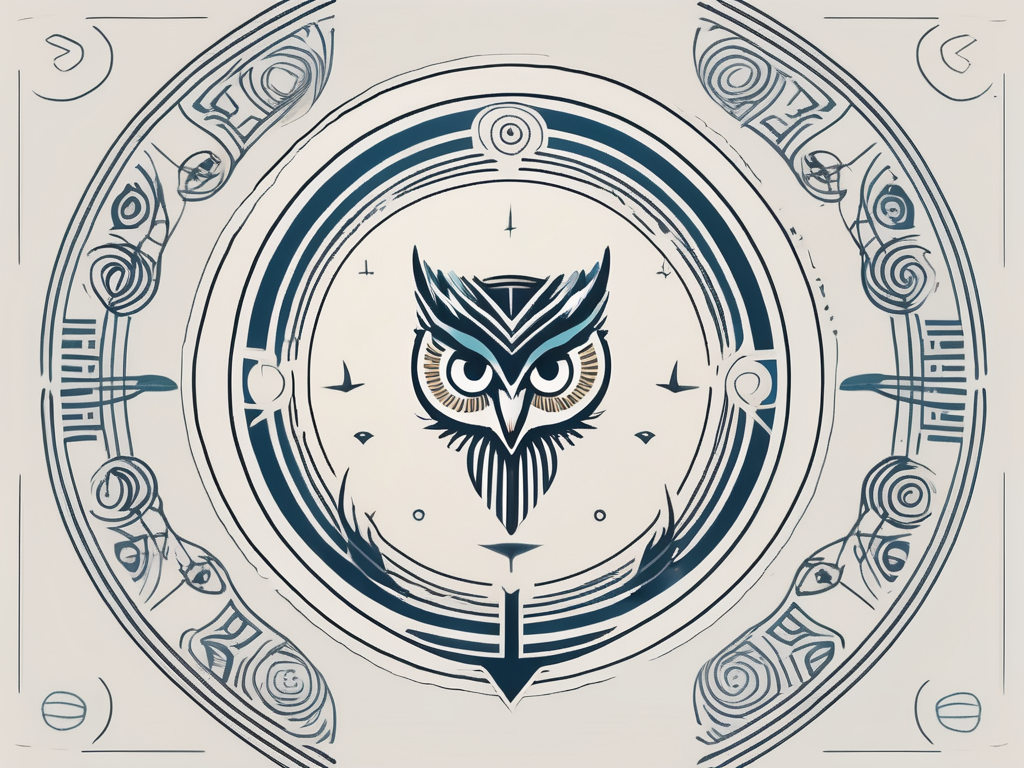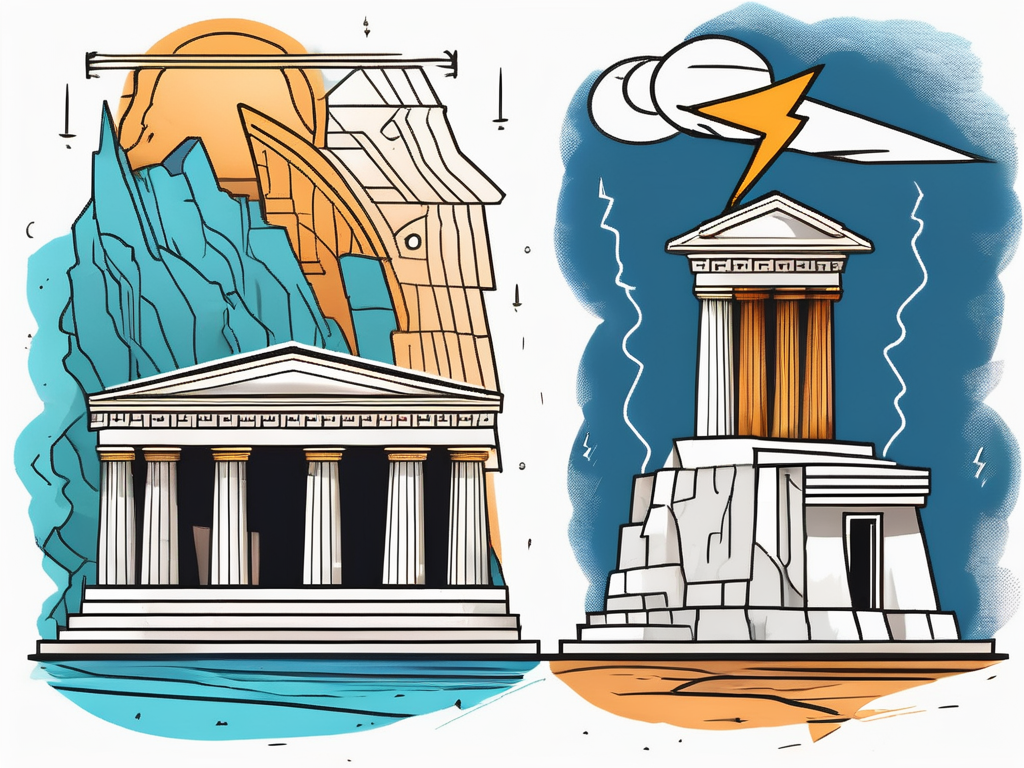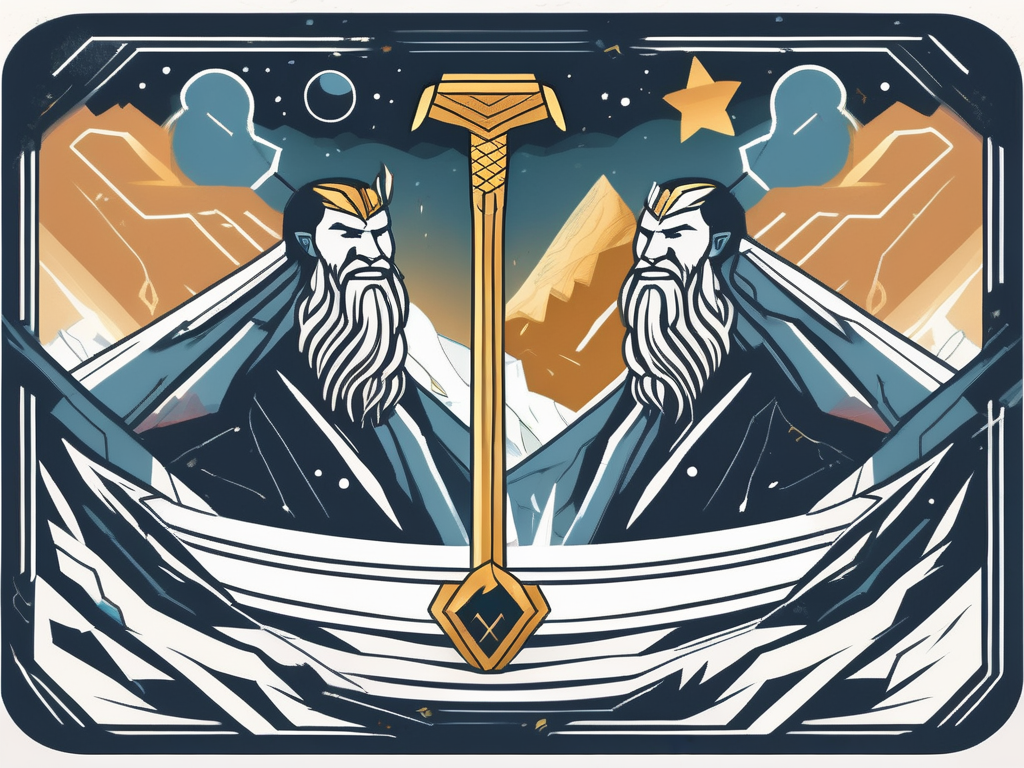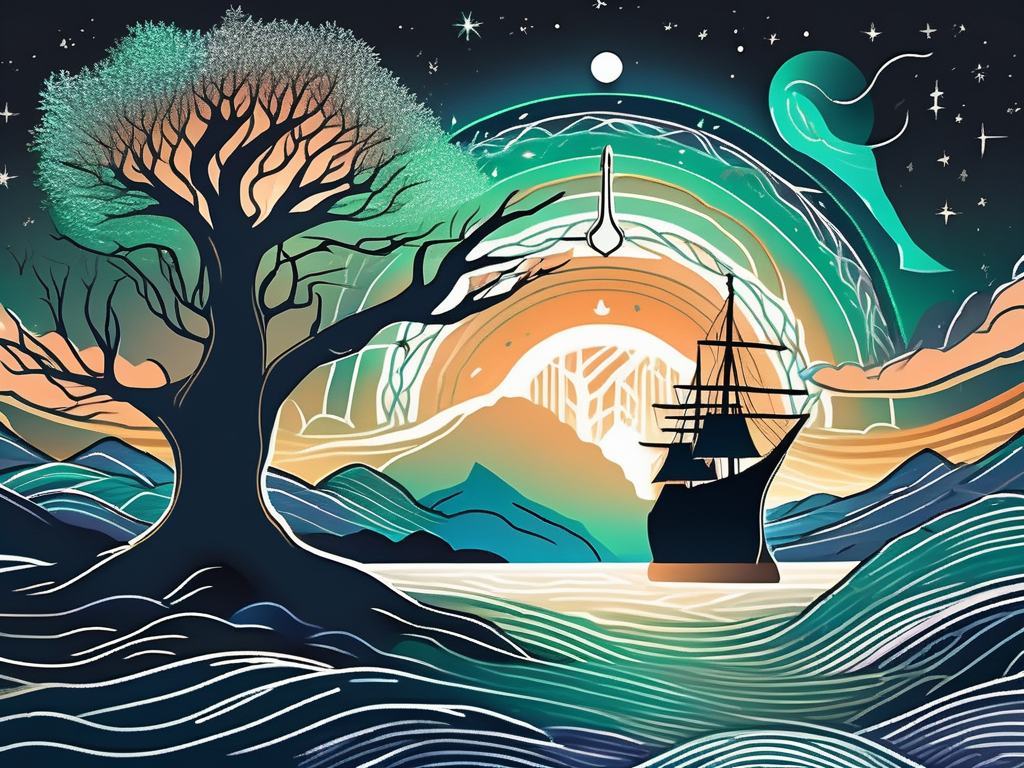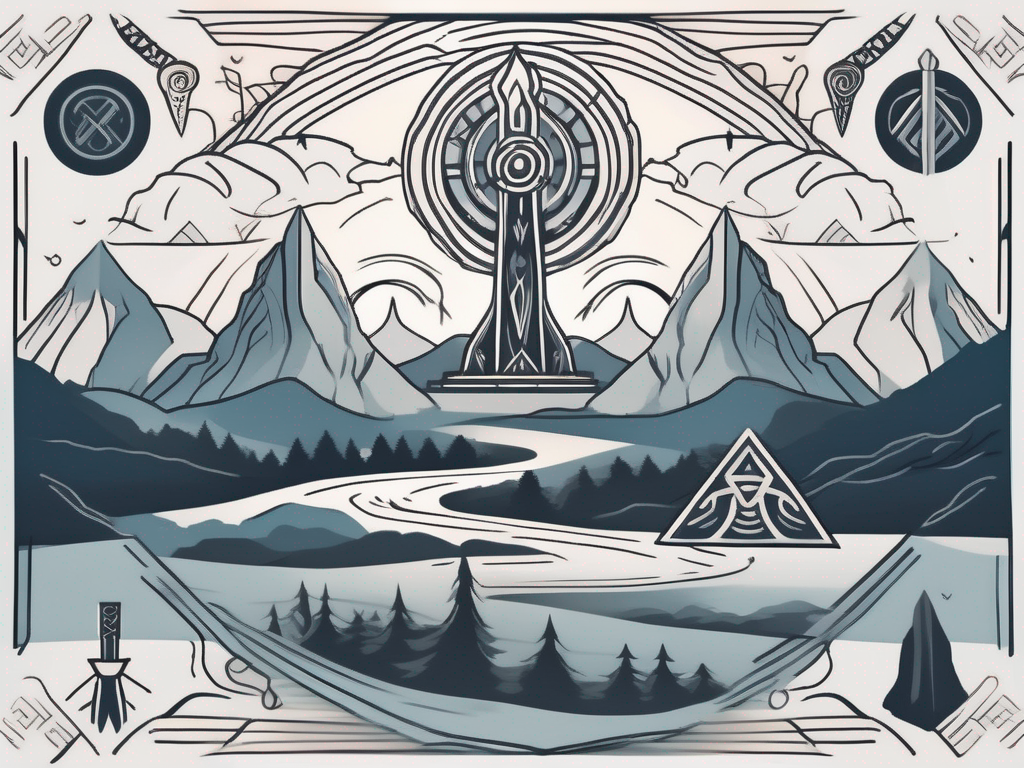Welcome to a captivating journey into the world of Greek mythology and the enigmatic figure of Eros. As one of the most beloved and intriguing gods, Eros has fascinated both ancient and modern minds alike. In this article, we will delve into the origins of Eros, his role in Greek mythology, the symbolism surrounding him, and his influence on art and literature. Prepare to be enchanted by the love god’s incredible tales and explore the deeper meaning behind his symbolism.
Understanding the Origins of Eros
Before we dive into the captivating tales of Eros, let’s take a moment to explore his origins in Greek mythology. According to ancient myths, Eros was born directly from Chaos, the primordial void. This makes him one of the oldest gods in the Greek pantheon. His birth represents the creation of desire and the powerful force that fuels the world.
In Hesiod’s Theogony, Eros is depicted as one of the primal gods, along with Gaia (Earth), Tartarus (the Underworld), and Nyx (Night). This emphasizes his fundamental role in shaping the universe.
Eros also appears in Homer’s Iliad, where he is portrayed as an impish and mischievous god, playing with the emotions of both mortals and immortals. His presence in this epic poem highlights his influence on human affairs and his ability to ignite passion and desire.
As the son of Chaos, Eros embodies the chaotic and unpredictable nature of desire. He is often depicted as a winged youth, armed with a bow and arrows. These arrows have the power to pierce the hearts of gods and mortals alike, causing them to fall madly in love or experience intense desire.
One of the most famous stories involving Eros is the tale of Cupid and Psyche. In this myth, Psyche, a mortal princess, is so beautiful that people begin to worship her instead of Aphrodite, the goddess of love. Outraged, Aphrodite commands Eros to make Psyche fall in love with the most hideous creature on earth. However, when Eros sees Psyche, he himself falls in love with her and takes her as his wife. This story showcases Eros’ ability to defy even the gods and the unpredictable nature of love.
Another fascinating aspect of Eros’ mythology is his connection to the concept of love in its various forms. While Eros is often associated with romantic love, he is also linked to familial love, friendship, and even self-love. This highlights the complexity and depth of human emotions that Eros represents.
Throughout Greek literature and art, Eros is a recurring theme, symbolizing the driving force behind human desires and passions. Whether it is the longing for a romantic partner, the yearning for success, or the pursuit of artistic expression, Eros is the catalyst that propels individuals to seek fulfillment and connection.
In conclusion, Eros, born from Chaos, is an ancient and influential god in Greek mythology. His origins in the primordial void, his role in shaping the universe, and his mischievous nature showcased in epic poems like the Iliad, all contribute to his significance. The stories surrounding Eros, such as the tale of Cupid and Psyche, and his association with different forms of love, further deepen our understanding of this complex deity. Eros continues to captivate and inspire us, reminding us of the powerful force that drives our desires and fuels our lives.
The Role of Eros in Greek Mythology
Eros is commonly known as the god of love, but his role extends beyond romantic connections. He represents the powerful force that binds all beings together, from family love to the love between friends. Eros embodies the essence of affection and the longing for connection that defines the human experience.
One of the most famous stories involving Eros is the myth of Eros and Psyche. This tale explores the transformative power of love and the trials that lovers must endure to achieve true happiness. It highlights Eros’ ability to navigate the complexities of love, bringing people together and fostering personal growth.
Eros’ influence is not limited to mortals alone; he also has a profound impact on the gods. In Greek mythology, even the great Zeus, ruler of the gods, falls under Eros’ spell. This demonstrates the god’s universal power and his ability to humble even the mightiest deities.
But Eros’ role in Greek mythology goes beyond his influence on love and relationships. He is also associated with desire and passion. In ancient Greece, desire was seen as a driving force that motivated individuals to pursue their goals and ambitions. Eros, with his arrows that ignite desire in the hearts of mortals and gods alike, symbolizes this primal urge.
Furthermore, Eros is often depicted as a mischievous and playful deity. His mischievous nature is evident in the myth of Eros and Apollo. In this story, Eros shoots Apollo with one of his arrows, causing the god to fall in love with the nymph Daphne. This playful act leads to a series of events that ultimately result in Apollo’s unrequited love and Daphne’s transformation into a laurel tree.
Additionally, Eros is closely associated with beauty and aesthetics. In Greek art, he is often portrayed as a young and handsome winged god. His physical appearance reflects the idealized standards of beauty in ancient Greece, emphasizing the connection between love, desire, and beauty.
Moreover, Eros’ role as the god of love extends beyond the realm of humans and gods. He is also believed to have influence over nature and the animal kingdom. In Greek mythology, Eros is associated with the mating and reproduction of animals, symbolizing the perpetuation of life and the continuation of the natural order.
In conclusion, Eros plays a multifaceted role in Greek mythology. He represents the universal force of love and affection that binds all beings together. His influence extends beyond romantic connections, encompassing family love, friendship, and even the desires and passions that drive individuals. Eros’ mischievous and playful nature adds a dynamic element to his character, while his association with beauty and aesthetics highlights the connection between love and aesthetics. Furthermore, Eros’ influence is not limited to humans and gods alone; he also holds sway over nature and the animal kingdom. Overall, Eros embodies the complexities and nuances of love in all its forms, making him a central figure in Greek mythology.
The Symbolism of Eros
Delving into the symbolism surrounding Eros uncovers deeper layers of meaning associated with this captivating god. Eros is often portrayed as a symbol of passion and desire, representing the irresistible pull between individuals.
One of the most iconic symbols associated with Eros is his bow and arrows. The arrows, said to be dipped in a magical love potion, have the power to make anyone fall in love. This imagery emphasizes Eros’ role as the facilitator of love, igniting the flames of passion and bringing hearts together.
Furthermore, the bow and arrows symbolize the delicate balance between control and surrender in matters of the heart. Eros, with his precise aim, reminds us that love can be both a force that we can direct and something that can overpower us. It highlights the vulnerability and unpredictability of love, as well as the need for trust and surrender in romantic relationships.
Another significant symbol of Eros is his wings, which represent both freedom and restlessness. Eros’ ability to inspire love can lead to liberation, but it can also evoke a sense of longing and yearning for something unattainable. The wings embody the paradoxical nature of love and its ability to both uplift and torment.
Moreover, the wings symbolize the ephemeral nature of love. Like a fleeting butterfly, love can be elusive and transient. Eros’ wings remind us to cherish and appreciate love when it is present in our lives, for it may flutter away as quickly as it arrived.
In addition to the bow and arrows and the wings, another symbol associated with Eros is the blindfold. Eros is often depicted blindfolded, representing the blind nature of love. Love is said to be blind because it does not discriminate or judge. It can strike anyone, regardless of their appearance, social status, or background. The blindfold also symbolizes the surrender of control and the need to trust in the mysterious and unpredictable nature of love.
Furthermore, the blindfold represents the idea that love is not solely based on physical attraction. It transcends the superficial and delves into the depths of the soul. Eros, with his blindfold, reminds us that love is a profound connection that goes beyond the surface, encompassing emotional, intellectual, and spiritual dimensions.
In conclusion, the symbolism of Eros is rich and multifaceted. From his bow and arrows that represent the power and vulnerability of love, to his wings that embody its fleeting and paradoxical nature, to his blindfold that symbolizes the indiscriminate and profound nature of love, each symbol adds depth and complexity to our understanding of Eros and the enigmatic force he represents.
Eros in Art and Literature
The timeless allure of Eros is evident in the art and literature of both ancient and modern civilizations. In ancient Greek art, Eros is often depicted as a young winged boy, representing youthful vigor and innocence. He is frequently shown in the company of other gods, reminding us of his vital role in the divine hierarchy.
In Greek and Roman literature, Eros is a central figure in many poetic and mythological works. From the passionate verses of Sappho to the epic tales of Ovid’s Metamorphoses, Eros’ influence permeates the words of the great writers of antiquity. These stories continue to captivate readers and evoke a sense of wonder and longing.
Modern interpretations of Eros explore his relevance in contemporary society, examining the complexities of love and desire in a rapidly changing world. Artists and writers continue to draw inspiration from Eros, reinventing his image and exploring new facets of his mythology.
As we navigate the intricate web of Greek mythology and symbolism, the figure of Eros remains a captivating and enigmatic presence. His tales of love and desire resonate with us on a deep and universal level. From his origins in Chaos to his influence on mortals and gods alike, Eros embodies the essence of what it means to be human. His symbolism continues to inspire artists and writers, reminding us of the enduring power of love in all its forms. So, let us embrace the magic of Eros and embark on this extraordinary journey into the heart of Greek mythology.



